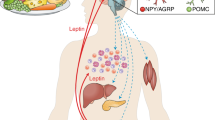Abstract
A TOTAL deficiency in or resistance to the protein leptin causes severe obesity1–4. As leptin levels rise with increasing adiposity in rodents5 and man6,7, it is proposed to act as a negative feedback 'adipostatic signal' to brain centres controlling energy homeostasis, limiting obesity in times of nutritional abundance1,3. Starvation is also a threat to homeostasis that triggers adaptive responses8–12, but whether leptin plays a role in the physiology of starvation is unknown. Leptin concentration falls during starvation13 and totally leptin-deficient ob/ob mice have neuroendocrine abnormalities similar to those of starvation14, suggesting that this may be the case. Here we show that preventing the starvation-induced fall in leptin with exogenous leptin substantially blunts the changes in gonadal, adrenal and thyroid axes in male mice, and prevents the starvation-induced delay in ovulation in female mice. In contrast, leptin repletion during this period of starvation has little or no effect on body weight, blood glucose or ketones. We propose that regulation of the neuroendocrine system during starvation could be the main physiological role of leptin.
Similar content being viewed by others
References
Zhang, Y. et al. Nature 372, 425–432 (1994).
Halaas, J. L. et al. Science 269, 543–546 (1995).
Campfield, L. A. et al. Science 269, 546–549 (1995).
Stephens, T. W. et al. Nature 377, 530–532 (1995).
Frederich, R. C. et al. Nature Med. 1, 1311–1314 (1995).
Maffei, M. et al. Nature Med. 1, 1155–1161 (1995).
Considine, R. V. et al. N. Engl. J. Med. 334, 292–295 (1996).
Cahill, J. G. et al. J. clin. Invest. 45, 1751–1769 (1966).
Schwartz, M. W., Dallman, M. F. & Woods, S. C. Am. J. Physiol. 269, R949–R957 (1995).
Dallman, M. F. et al. Front. Neuroendocr. 14, 303–347 (1993).
Bronson, F. H. & Marstellar, F. Biol. Reprod. 33, 660–667 (1985).
Connors, J. M. et al. Endocrinology 117, 900–906 (1985).
Frederich, R. C. et al. J. clin. Invest. 96, 1658–1663 (1995).
Bray, G. A., Fisler, J. & York, D. A. Front. Neuroendocr. 14, 128–181 (1990).
Schreihofer, D. A., Amico, J. A. & Cameron, J. L. Endocrinology 132, 1890–1897 (1993).
Bates, G. M. Clin. Obstet. Gynec. 28, 632–644 (1985).
Tartaglia, L. A. et al. Cell 83, 1263–1271 (1995).
Lee, G.-H. et al. Nature 379, 632–635 (1996).
White, J. D. & Kershaw, M. Molec. cell. Neurosci. 1, 41–48 (1989).
Pierroz, D. Q. et al. Endocrinology 137, 3–12 (1996).
Chebab, F. F., Lim, M. E. & Lu, R. Nature Genet. 12, 318–320 (1996).
Erickson, J. C., Clegg, K. E. & Palmiter, R. D. Nature 381, 415–418 (1996).
Cooper, R. L. et al. Endocrinology 114, 391–396 (1984).
Qu, D. et al. Nature 380, 243–247 (1996).
Author information
Authors and Affiliations
Rights and permissions
About this article
Cite this article
Ahima, R., Prabakaran, D., Mantzoros, C. et al. Role of leptin in the neuroendocrine response to fasting. Nature 382, 250–252 (1996). https://doi.org/10.1038/382250a0
Received:
Accepted:
Issue Date:
DOI: https://doi.org/10.1038/382250a0
- Springer Nature Limited
This article is cited by
-
The multifaceted therapeutic value of targeting steroid receptor coactivator-1 in tumorigenesis
Cell & Bioscience (2024)
-
Sex differences in energy metabolism: natural selection, mechanisms and consequences
Nature Reviews Nephrology (2024)
-
The melanocortin action is biased toward protection from weight loss in mice
Nature Communications (2023)
-
Could leptin substitution therapy potentially terminate entrapment in anorexia nervosa?
Nature Reviews Endocrinology (2023)
-
Neural basis for fasting activation of the hypothalamic–pituitary–adrenal axis
Nature (2023)





